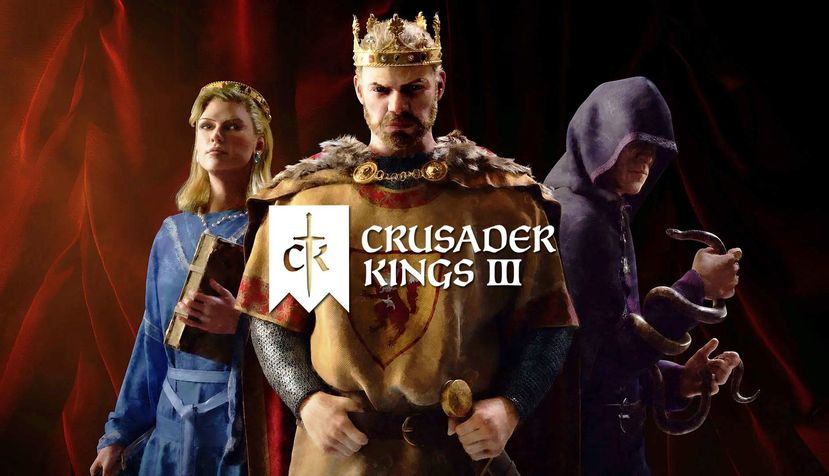Crusader Kings Iii
There is an interesting niche in gaming for games that allow for roleplay without strictly being roleplay games. Games like Rimworld or the Sims allow players to tell a character’s story - or have that story told to them - without actually having to embody the character. It creates an interesting dynamic where there is strategy, but equally, the strategy serves to further the story. This, in turn, creates an addictive experience, where the strategic goals make the roleplay compelling, and the roleplay and story generation feed into the next strategic goal.
Anyway, this review is late because I now have 200 hours in Crusader Kings III.
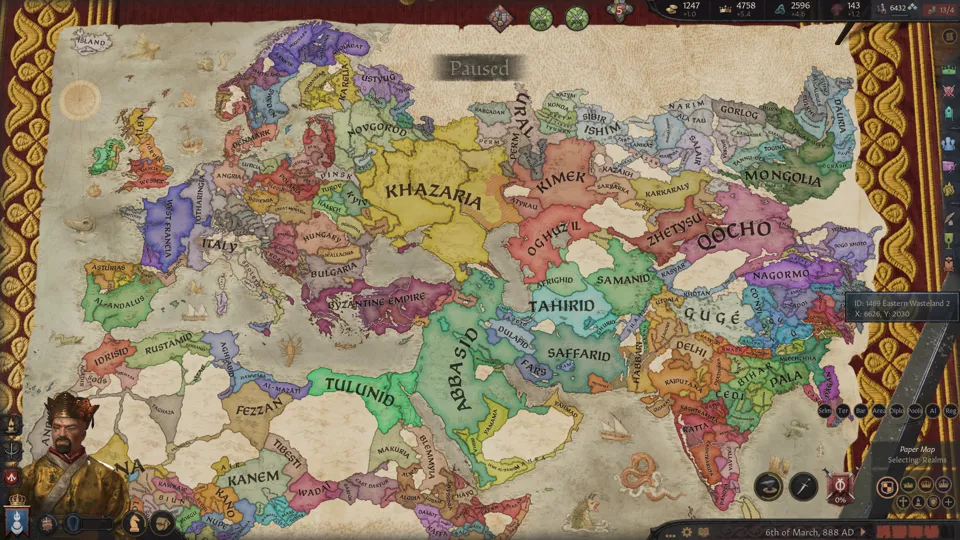 This is you, and you are amazing.
This is you, and you are amazing.
Crusader Kings III is a simulation/roleplaying game masquerading as a grand strategy game. You play as one of any number of thousands of rulers in medieval Afro-eurasia. You can choose to play an existing historic ruler or create your own, but, once the game begins, you follow the story of not only your ruler, but of their descendants. Players can choose to take over the world, or simply be. The story is entirely up to the player to shape.
The skill of Crusader Kings III, then, varies depending on what the player’s goals actually are. Personally, I tend to be a “rule the world” kind of player, and so I invest in building up my military, carefully choosing what to build to match the landscapes I’ll encounter, and building infrastructure. More importantly, though, I invest in advantageous marriages for my dynasty members, creating casus bellis that allow me to invade my neighbours.
At its core, the strategy of Crusader Kings III is less in its world map and its military battles. Crusader Kings III is a family strategy game. It’s a game of picking out advantageous marriages, managing children’s upbringing, and carefully cultivating beneficial genes. That these family members are then pretexts for world domination is a happy bonus to the eugenics simulator.
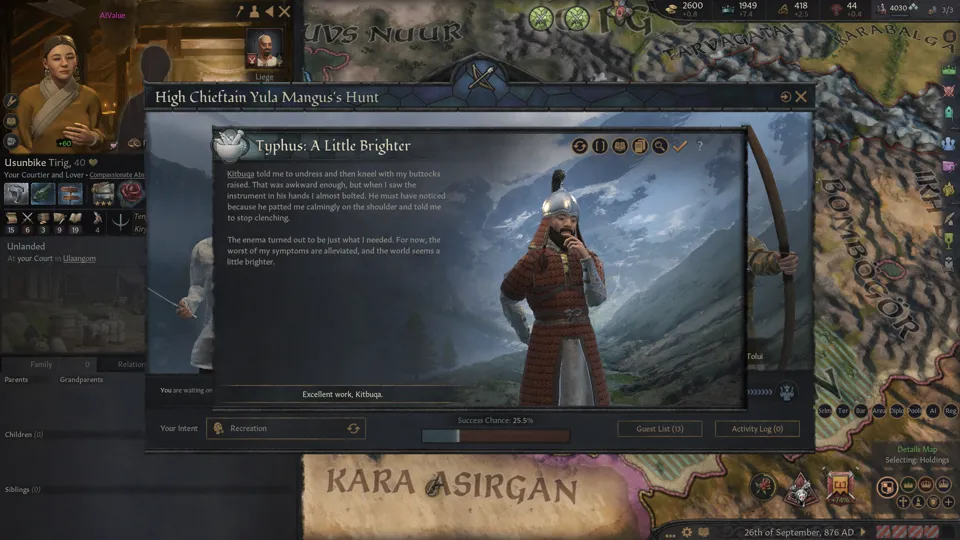 Did I mention the game is medieval?
Did I mention the game is medieval?
As a grand strategy game, Crusader Kings III feels a bit shallow. Its battle mechanics are simple, and the movements of armies are in many ways just watching the large number devour the smaller numbers. While the game does add terrain as a fairly effective modifier on combat, the actual act of marching into battle is fairly shallow.
However, the strength of Crusader Kings III isn’t in its battle strategy or war management, nor does it pretend to be. Crusader Kings III is a story generator. It gives the player the engine through which they can tell the story of their particular dynasty. To that end, it includes a wealth of ways to tell the story of their particular character and the people that exist within their orbit. The various events and characters make the world feel alive and dynamic, giving greater meaning to whatever shenanigans the player character is up to.
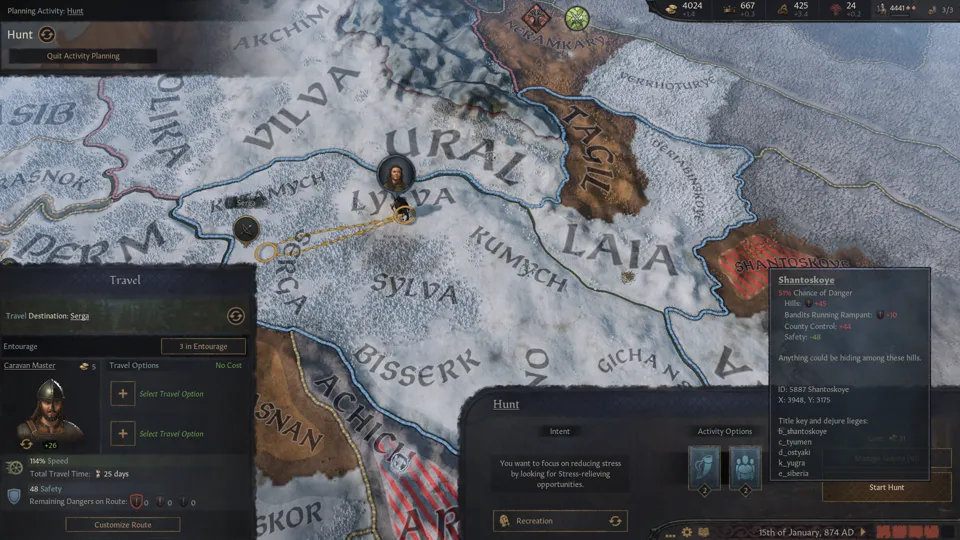 January in Siberia is a great time to go hunting.
January in Siberia is a great time to go hunting.
As with any story generator, the game’s ability to remain immersive and compelling is largely dependent on what the player themselves is putting into the game and what they intend to accomplish within it. While the strategic elements and the building towards some goal help provide some sort of impetus, the strategy alone isn’t enough to overcome the sometimes repetitive random events and tedium of being an impoverished lord. Seeing how those repetitive events play out within a particular situation or lifetime, however, gives a little more meaning, especially when viewed as roleplaying moments. My khan’s quest to woo his wife, for example, may greatly resemble his father’s attempts to court his wife, but because it is a new khan with a new perspective, the events somehow manage to stay fresh and new.
This variation of responses to a fairly fixed set of events is also helped by the traits system. Each character has a set of traits that determine how they view and interact with the world. Acting in accordance with their traits relieves stress, while acting in opposition to them gains stress. It’s a small mechanic, but it incentivises the player to respond to events suboptimally, and ultimately serves as a roleplay aid.
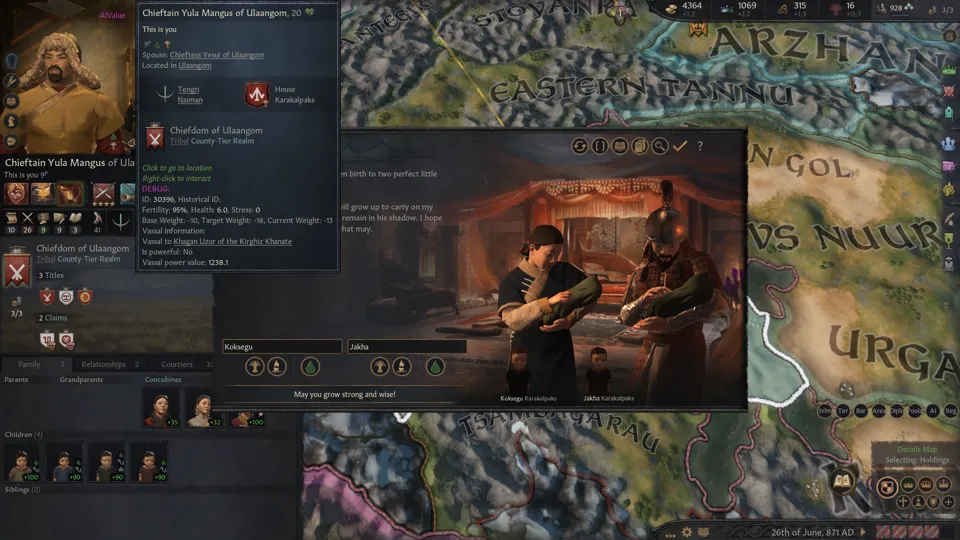 Pro tip: Your starting leader should always be lustful.
Pro tip: Your starting leader should always be lustful.
Moreso than most games, the play experience of Crusader Kings III is dependent on the player themselves and what it is they would like to get out of the game. If the player is looking for some grand strategy game where they can carefully pick out a path to world domination, this game is a bit too shallow in its mechanics to allow that. However, as a sim game and a roleplaying game, it is fantastic, providing an opportunity to tell both a grand epic and soft, gentle stories within a dynamic world. Crusader Kings III is an engine for player creativity, lighted braised with strategy, but ultimately a sim game.
Developer: Paradox Development Studio
Genre: Strategy, Simulation
Year: 2020
Country: Sweden
Language: English
Play Time: Oh Sweet Jesus
Youtube: https://youtu.be/6mMyHWxpNlo
